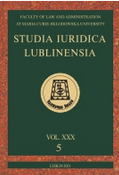The Subjective Dimension of Fake News
The Subjective Dimension of Fake News
Author(s): Marzena BarańskaSubject(s): Media studies, ICT Information and Communications Technologies
Published by: Wydawnictwo Naukowe Uniwersytetu Marii Curie-Sklodowskiej
Keywords: fake news; Internet; manipulated data; perception of reality; disinformation; generally applicable law;
Summary/Abstract: The universal access to the Internet contributed to the dissemination and popularization of fake news. Their function is quite broad – they can influence the results of political elections, social attitudes and behavior or stock market quotations, and weaken social trust in particular categories of our existence. In the age of the Internet, thousands of new content with manipulated data is circulated every day, without any reliable research that destabilizes the perception of reality. Disinformation is not a new phenomenon, but it has never been such a powerful weapon. The omnipresence of fake news raises questions about the subject side, i.e. senders, content distributors, sources of responsibility for the published material. The aim of this article is an attempt to systematize the concept of fake news and indicate the entities responsible for broadcasting this type of content in the context of applicable law. For this reason, the following hypothesis was adopted: The indifference of approaches in defining the concept of fake news means that the authors and entities distributing content are not aware of the contradiction of the actions taken with generally applicable law. As a consequence, elements of the concept of fake news were distinguished and the entities disseminating this type of content were characterized. The article organizes the state of knowledge regarding fake news and fills the research gap.
Journal: Studia Iuridica Lublinensia
- Issue Year: 30/2021
- Issue No: 5
- Page Range: 53-74
- Page Count: 22
- Language: English

